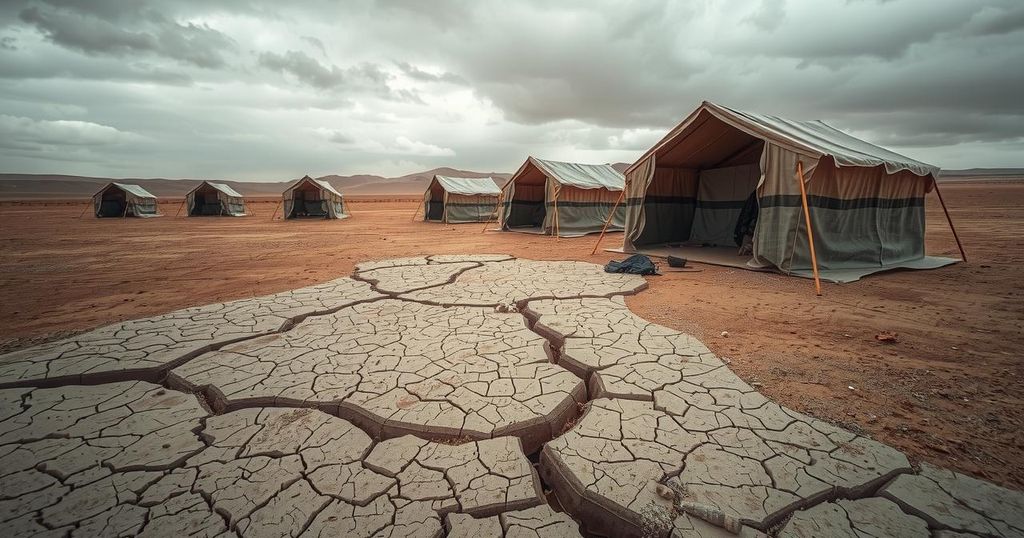Over 200,000 Sudanese refugees in Libya face severe human rights violations, according to the UN, with many fleeing violence in Sudan. They often lack identity documents, leading to arrests and detention. Conditions in Libya are dire, and the UN calls for increased international support to prevent further migration and improve the lives of these vulnerable populations.
The United Nations has raised alarms regarding the plight of over 200,000 Sudanese refugees who have fled the ongoing conflict in Sudan and sought refuge in Libya. Many of these individuals are vulnerable to gross human rights violations, and without assistance, they may attempt to migrate to Europe. The conflict, which has lasted since April 2023 between the Sudanese army and the Rapid Support Forces, has displaced ten million people, with two million seeking refuge in neighboring countries.
Since January 2025, it has been estimated that 210,000 Sudanese refugees reside in Libya without proper identity documents, making them subject to immediate arrest under Libyan law. Omar, a lawyer involved with supporting refugees in Libya, explains, “That’s why Sudanese refugees are usually arrested immediately and taken to detention centres or police stations, where we as lawyers have to intervene.” The UNHCR has reported a daily influx of 400 to 500 refugees arriving at the Alkufra district in southeastern Libya alone.
Omar, part of the Libyan Anti-torture Network (LAN), highlights the severe human rights abuses that Sudanese refugees endure in Libya, including arbitrary arrests, extortion, and torture, despite their rights under international refugee laws. Libya has not acceded to the 1951 UN Refugee Convention but has signed a similar African Union agreement, offering little protection as detentions of refugees persist.
Lawyers like Omar provide critical support to detainees, helping secure release through fines, but many remain languishing in detention without trial for long periods. Refugees face dire conditions, with reports of homelessness, robbery, and forced labor among children. Children, in particular, are at heightened risk, which is concerning given the inadequate support from organizations like the UNHCR and the IOM.
In northern Libya, conditions differ; capital Tripoli offers refugees the opportunity to register with the UNHCR, which may lead to resettlement in third countries. However, only a limited number are actually resettled, with Germany receiving around 450 refugees. Many Sudanese refugees, eager for a better future, attempt perilous crossing of the Mediterranean, with around 6,000 reaching Italy from Libya between early 2023 and April 2024.
Efforts by the European Union to prevent migration involve substantial funding for the Libyan coastguard, effectively leading to the interception and return of individuals attempting to flee to Europe. These refugees face serious danger upon return, often resulting in death or further maltreatment. UN High Commissioner for Refugees, Filippo Grandi, emphasizes the need for rich countries to provide adequate support to prevent such migration pressures.
Humanitarian organizations, like LAN, document atrocities and inform international bodies in order to advocate against these violations. Compelling evidence has come to light regarding collaborations between Libyan coastguards and human traffickers, worsening the cycle of abuse. Despite some progress in closing detention centers, the continuous risk to migrants remains dire.
Desperate attempts to escape Libya become increasingly treacherous. Those trying to cross into Tunisia are often returned to detention centers and may suffer further abuses while trapped within Libya’s penal system. The discovery of mass graves underscores the immense tragedy of these journeys, as the deaths of numerous refugees go unacknowledged. The UNHCR continues to push for improved conditions and assistance to those affected by the ongoing crisis in Libya and along migration routes.
The situation for Sudanese refugees in Libya is critical, marked by severe human rights violations and a lack of support. With over 200,000 seeking refuge, many may resort to dangerous migratory routes toward Europe if assistance is not promptly provided. Notably, the environment in Libya remains perilous due to ongoing internal conflict and inadequate legal protections for vulnerable populations. International organizations advocate for the recognition and improvement of refugee conditions, while underscoring the need for collaborative efforts to address the humanitarian crisis.
Original Source: www.swissinfo.ch




